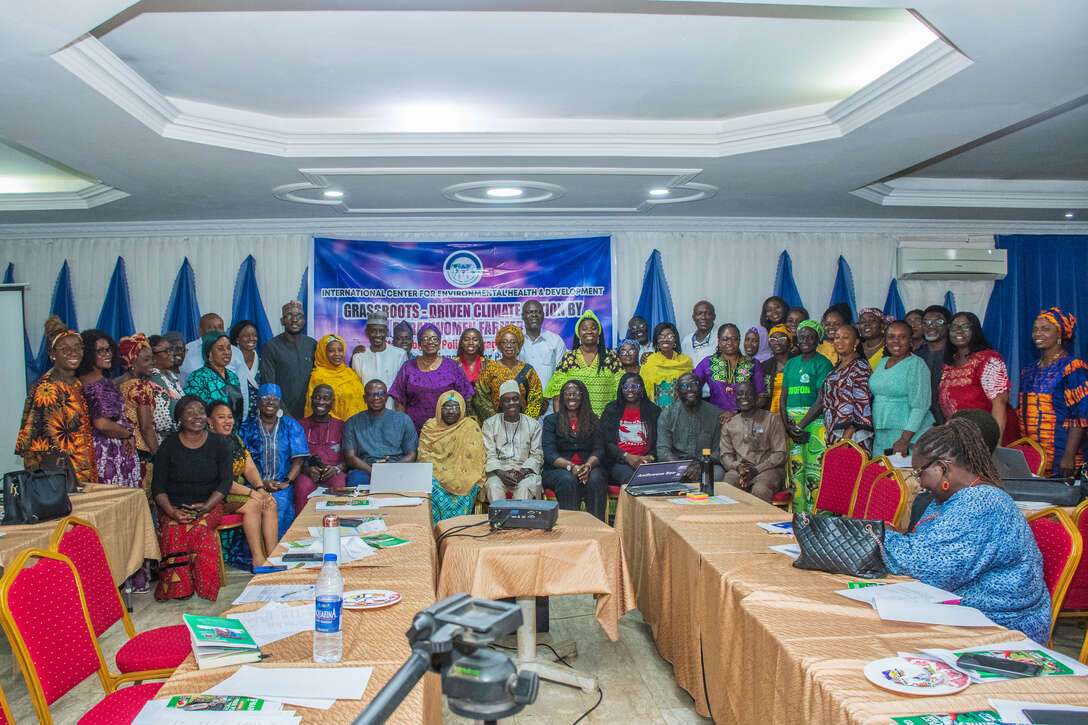HELD ON FRIDAY, 24 TH JANUARY 2025, AT ROYALTON HOTEL, AREA 2, GARKI-ABUJA
Introduction:
The International Centre for Environmental Health and Development (ICEHD), in partnership with the Federal Ministry of Agriculture and Food Security (FMAFS) organized the Stakeholders Policy Engagement Forum, in collaboration with the National Steering Committee on the National Gender Policy on Agriculture, which was held to review the existing National Gender Policy in Agriculture and address gaps in its implementation. The event supported by African Women Development Fund (AWDF) under the Grassroots-Driven climate Action by Rural Women Farmers in Nigeria, brought together key stakeholders, including gender and policy experts, government policy officials, civil society organizations (CSOs), development partners, women farmers and farming cooperatives.
Objectives:
- Assess the effectiveness of the 2019 National Gender Policy on Agriculture and its impact on gender equality in the sector.
- Identify key gender gaps, challenges, and best practices in the policy’s implementation.
- Develop a roadmap for an improved, gender-responsive policy framework.
Key Highlights:
- Opening Remarks:
- Mrs. Kachalla Z. Damaturu (Director, Special Duties, FMAFS) emphasized agriculture’s role in national GDP and highlighted barriers to women’s participation in decision-making and resource access.
- Mr. Azubike Nwokoye (Chairman, National Steering Committee) noted the importance of state-level implementation and announced funding from AGRA for policy-related engagements.
- Dr. Ndudi Bowei (Consulting Partner, ICEHD) stressed the intersection of gender, agriculture, and climate change and the significance of gender-responsive policy in ensuring sustainable development.
- Challenges Identified:
- Limited access to agricultural finance for women.
- Weak gender integration in policy implementation at the state level.
- Lack of gender-disaggregated data for tracking policy impact.
- Exclusion of women from land ownership and agricultural decision-making.
- Recommendations & Policy Roadmap:
- Strengthen gender-responsive budgeting for agricultural programs.
- Improve extension services for women farmers.
- Enhance partnerships with development agencies for policy support.
- Domesticate the policy at state levels and form State Steering Committees.
- Emphasis was placed on collaboration between government, CSOs, and the private sector for policy implementation.
Next Steps:
- Finalization of the policy review roadmap by February 2025.
- Stakeholder validation and approval by mid-2025.
- Complete policy review processes
- Implementation and tracking mechanisms to ensure measurable impact.
Conclusion:
The forum reaffirmed the critical role of gender-responsive policies in agriculture and called on government agencies, donors, and CSOs to drive implementation. Stakeholders emphasized the need for policy alignment with climate resilience strategies and enhanced participation of women in agricultural governance.
